The new year is here, and with it comes a fresh group of ventures deserving our attention.
As part of a DC Inno special report, we’re spotlighting the next wave of companies poised for growth. They’re emerging from stealth mode, chasing new funding and scooping up other businesses in the process. They’ve weathered the coronavirus pandemic, altered roadmaps and repositioned themselves to attack 2021. They’re ready for what’s to come.
These startups span geography, industry, size and stage — from the budding concept that has yet to earn a buck to the matured firm eyeing its initial public offering to the newest biotech to hit the Nasdaq, and everything in between. They represent a fraction of the innovation cropping up in Greater Washington, a mere sampling of the potential the region’s entrepreneurs bring to the table.
Some names will ring a bell. Others won’t, yet. All might not make it big, but they have the foundation necessary to excel.
And we’ll be watching all the way.
Arrow Birth
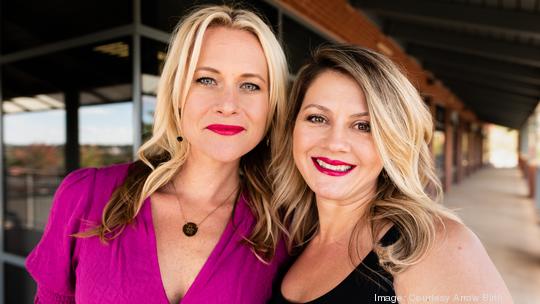
Arrow Birth launched its platform in spring 2019, three years after its founding. Demand for its service only grew during the pandemic.
The doula duo behind the business opened a seed round to fund digital marketing and hire a new employee to get the word out that it’s live. But the partners, Tara Campbell Lussier and Mari Stutzman Smith, then opted to put off that raise in favor of a larger round in 2021. That’s after having bootstrapped the venture with about $50,000 of their own money.
The startup, which functions as an educational and family support system during and after pregnancy, provides on-demand childbirth and new parenting courses, and one-on-one consultations.
The partners are now looking to advance three revenue streams: direct-to-consumer sales, revenue-sharing with health systems and a corporate benefit model. They’re planning to expand a campaign to eliminate Black maternal mortality disparities, scale its employer family-benefits platform and build out the mobile app. And they’re intending to officially drop “Birth” from the name, to more accurately reflect its scope and desire to build out coursework for parents beyond a baby’s delivery.
The partners said they’ve already seen some fruits of their labor: They turned down a “compelling offer” for the company last year from an interested buyer.
The basics
- Location: Ashburn
- Founded: 2016
- Leadership: Tara Campbell Lussier and Mari Stutzman Smith, co-founders
- What it does: Connects new and expectant mothers with courses and consultations
- Revenue: Grew fivefold in 2020; projecting high six-figures, less than $1 million for 2021
- Employees: Eight staff, 20 consultants, more than 70 in professional network
Nanochon LLC
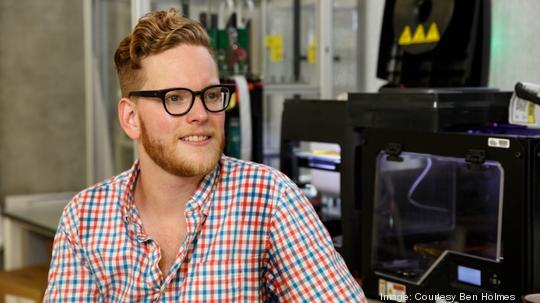
District med-tech startup Nanochon is shooting to close a $3.5 million seed round in January to fund the first human study of its product, a 3D-printed implant made with George Washington University-licensed technology that replaces lost or damaged cartilage as an alternative to replacement surgeries. If all goes as planned, that clinical trial would kick off later this year.
The institutional round is the company’s first, after securing less than $500,000 to date through grants and some friends-and-family investments. The business is gaining early recognition for its product, which aims to shorten a patient’s recovery time at a lower cost. That includes going through the University of California, San Francisco’s Rosenman Innovators program and Johnson & Johnson Innovation’s JLABS incubator.
Nanochon must execute multiple studies and earn approval from the Food and Drug Administration before it can reach patients, which could happen by the start of 2025. And it will need to raise more funding to get there, probably about $20 million to go to market.
But there’s more on tap for the 5-year-old startup: taking the implant to market with a strategic partner and eventually selling the business to an industry giant, said co-founder and CEO Ben Holmes. “That’s definitely still the goal.”
The basics
- Location: D.C.
- Founded: 2015
- Leadership: Co-founders Ben Holmes, CEO, and Nathan Castro, chief technology officer
- What it does: 3D-printed implants for joint injuries
- Revenue: Pre-revenue until 2024
- Employees: Eight
Route Analytics Inc.
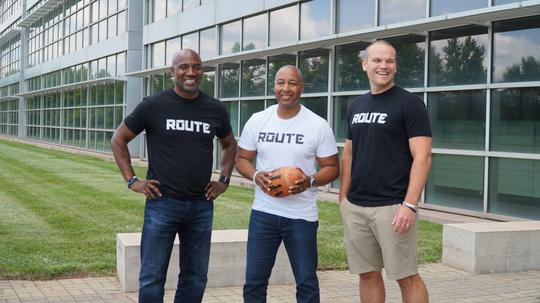
Data science startup Route Analytics emerged out of beta in late 2018 and has since developed a new version of its web and mobile app, which uses machine learning and predictive analytics to help student-athletes understand how they’d stack up at the college level.
The company helps high school athletes target the right programs, provides high school coaches data to inform recruiting and gives college recruiters a tool to more intelligently build their football programs. But its leadership also sees big opportunity with search engine marketing for other services for student-athletes (think: trainers and tutors) to provide sponsored content on the platform.
Route gained more users as camps and recruitment events for college football-bound high school athletes were canceled during Covid, co-founder and CEO Craig Ridley said. The company now counts more than 45 colleges and universities on that list.
The startup has raised $250,000 in outside capital to date and is shooting to secure another $500,000 to $750,000 to speed up product development and launch a digital marketing campaign. It expects to add data engineering, product development and digital media employees this year.
And long-term, it also sees opportunity beyond the U.S. and beyond football to basketball, soccer, baseball, track and field — all sports with high school participation.
The basics
- Location: Ashburn
- Founded: 2018
- Leadership: Co-founders Craig Ridley, CEO; Tom Booth, data scientist; Hassan Ali, chief technology officer; Wendell Smith, chief operating officer.
- What it does: Provides data for college football recruiting process
- Revenue: Less than $10,000 in 2020; projecting $200,000 for 2021
- Employees: Six
Electo Inc.
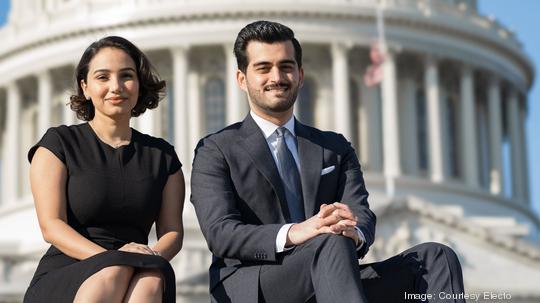
The husband-wife partners behind Electo launched their platform in September 2020 amid a heated presidential race, then set out to raise their first-ever funding round to grow the venture, a nonpartisan app with direct updates from elected officials and candidates.
After bootstrapping the business, the co-founders — Naeim Khanjani CEO, and Soraya Bagheri, COO — hope to secure $1 million in seed financing to market its free app. That product offers a general news feed that users can customize, while sourcing information from sites like Congress.gov and Data.gov. It also allows users to donate small amounts in grassroots fundraising to campaigns.
But there’s more on the docket for 2021. Electo is now building a subscription model for corporations, nonprofits, elected officials, congressional offices, state legislators, advocacy groups and organizations. That’s slated to go live by mid-year.
And it’s hiring, looking to double the size of its team — currently 10 people — each year for the next five years. It’s a refugee-led, immigrant-led and woman-led tech company that’s “committed to finding talent from underrepresented communities,” the co-founders said.
The basics
- Location: D.C.
- Founded: 2019
- Leadership: Co-founders Naeim Khanjani CEO, and Soraya Bagheri, COO
- What it does: Collects primary source information about candidates and elected officials
- Revenue: Pre-revenue in 2020; projecting more than $1 million for 2021
- Employees: 10, plans to double in 2021
OncoImmune Inc.

OncoImmune inked a deal in November to sell parts of itself to Merck & Co. for $425 million in cash. But the Rockville biopharmaceutical company isn’t going away.
That agreement gave New Jersey-based Merck its Covid-19 program, but not OncoImmune’s other assets. So what’s left — including its immuno-oncology candidates — will form a new business in which Merck plans to invest $50 million as a minority shareholder. And that spinout is worth watching, as it pursues clinical trials in cancer therapy under the leadership of Yang Liu, who will helm the OncoImmune spinout as its CEO.
But we’re also keeping a close eye on the piece selling to Merck, as that team seeks emergency use authorization for the coronavirus candidate, called CD24Fc, from the Food and Drug Administration and other countries’ regulatory agencies early this year. The deal with Merck followed positive interim data from its late-stage study of its lead drug candidate that found “compelling evidence regarding the use of CD24Fc in patients with severe and critical Covid-19 in our phase 3 trial,” Liu had said in November.
The business built on that momentum with a $56 million Series B raise in the fall, two decades after Liu started the company to develop molecular therapies for cancer and multiple sclerosis.
The basics
- Location: Rockville
- Founded: Spinout in 2020
- Leadership: Yang Liu, co-founder and CEO
- What it does: Develops therapeutics for cancer and autoimmune diseases
- Revenue: $425 million in 2020, projecting $150 million to $200 million for 2021
- Employees: 10
ClassEDU Inc.
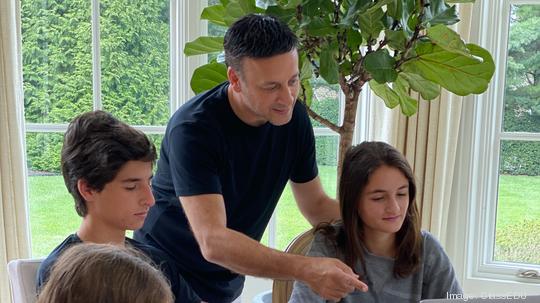
Blackboard co-founder Michael Chasen’s new ed-tech startup, ClassEDU, broke onto the scene with a quick $16 million in the fall — as virtual learning exploded amid coronavirus and students near and far continue working remotely. Then it opened 2021 with another $30 million in fresh funding partly from Owl Ventures.
Its product, built on top of the Zoom platform, allows teachers to proctor live tests, have one-on-one conversations, take attendance, distribute assignments and other tasks that are taken for granted during in-person learning.
The company sees big potential for its Class for Zoom offering, particularly in the corporate training arena. But it’s starting out targeting the 100,000 K-12 schools and higher education institutions nationwide currently using Zoom.
The business, now with 50 employees, plans to hire about 100 people across departments this year — necessary, it said, to accommodate its expected growth. It’s also plotting partnerships and product developments.
It’s a return to a familiar field for Chasen, who most prominently helped found and later sell Blackboard to a private equity firm for $1.64 billion in 2011. Since then, he has run and sold geolocation platform startup SocialRadar for $10 million, per a source, and led drone technology company PrecisionHawk in North Carolina.
The basics
- Location: D.C.
- Founded: 2020
- Leadership: Michael Chasen, co-founder and CEO
- What it does: An online learning company on top of the Zoom platform
- Revenue: Pre-revenue upon September 2020 launch, more than 6,000 schools and universities expressing interest; declined to disclose specifics.
- Employees: 50
K’ept Health

Sheena Franklin, a lobbyist-turned-entrepreneur, started the company in 2018 to keep cosmetic industry customers better informed about their products and their skin’s overall health, to simplify the skin care process and track what’s in users’ beauty cabinets — for example, expired goods or ingredients likely to cause irritations.
But what was then Well-Kept Beauty rebranded as K’ept Health in 2020, pivoting to make its artificial intelligence-enabled database applicable to the larger dermatology industry — and help close the existing equity gaps in health care. That move was informed by research K’ept Health conducted with the National Science Foundation and George Washington University’s dermatology department that showed women of color especially struggle to maintain skin health alongside dynamics such as pregnancy, breast cancer treatments, menopause, thyroid issues and other lifestyle factors.
Still in a private beta period, the company has grown its user base from 400 women in 2018 to 2,000 at the end of 2020. And the young startup won New York-based Hitlab’s Women’s Health Tech Challenge in December.
But Franklin is now looking to raise about $1 million as part of an effort to move the company out of its research phase and toward a launch by August. She’s working to bring doctors on board as contractors, to serve its target $6 billion market of wellness-minded women of all skin tones. And she plans to announce key strategic partnerships with skin care brands and at-home genetic testing companies, she said, declining to disclose details at this time.
But there’s more to come, she said.
The basics
- Location: D.C.
- Founded: 2018
- Leadership: Sheena Franklin, founder and CEO
- What it does: Provides skin care resources and support through a telemedicine app
- Revenue: Pre-revenue in 2020; projecting $750,000 for 2021
- Employees: Three
MarginEdge Co.
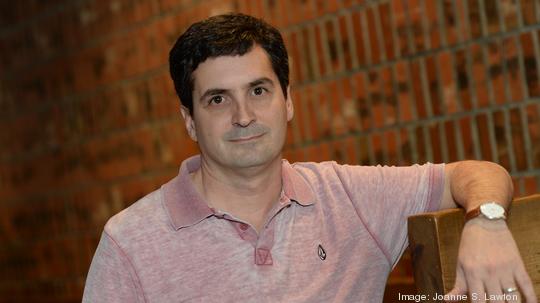
MarginEdge, whose software digitizes bookkeeping for its restaurant customers, raised $4 million in an oversubscribed round in November. That capital brought the tech company’s total funding since 2015 to more than $15 million, after it suffered a hard hit from the pandemic that continues to strain the restaurant industry.
The startup stayed in business through the lockdowns, pausing bills for clients that shut down and continuing to give them access to the service — avoiding mass layoffs itself and bringing on new paying customers along the way.
The company counts more than 1,500 restaurant clients, from independent shops to larger chains and franchises, across 37 states. And it’s looking to grow that this year.
The fresh funding will fuel sales and marketing, software development and potential expansion in the fintech arena. All the while, MarginEdge is seeking more vendor partners to spread its tech to more clients and help them streamline payments and operations.
The basics
- Location: Fairfax
- Founded: 2015
- Leadership: Bo Davis, co-founder and CEO
- What it does: Helps restaurants manage back-end paperwork
- Revenue: $3.5 million in 2020; projecting $7 million for 2021
- Employees: 166
The Most
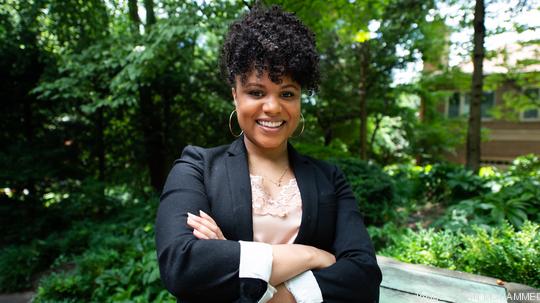
The Most has taken off since its 2018 launch, with a growing customer base for its tech-based hardware that proved to fill a hole in the market for consumers with naturally textured hair.
The startup sells tools, appliances and serums to make hair maintenance and styling easy and less time-intensive, largely for women of color with kinks, coils and curls. It’s now aiming to raise $545,000 by early February to finish developing its technology — and specifically, enable the business to commercialize its prototypes, perform additional testing and manufacture its products.
During 2020, the company secured a series of slots in prestigious programs: Glossier’s Black Beauty initiative, which meant $50,000 in grant funding and mentorship throughout the program; Sephora Accelerate, a six-month program for female founders in the beauty industry; and NextFab’s Rapid Hardware Accelerator program, which provides young startups capital and support through product development, among others.
Founder Dawn Myers, the mind behind The Most and a DC Inno on Fire winner of 2020, is also director of national nonprofit Vinetta Project’s D.C. chapter, where she’s working to close the gender funding gap.
The basics
- Location: D.C.
- Founded: 2018
- Leadership: Dawn Myers, founder and CEO
- What it does: Makes appliances for curly hair
- Revenue: Declined to disclose for 2020; projecting $1.6 million for 2021
- Employees: 10
Aziyo Biologics Inc.
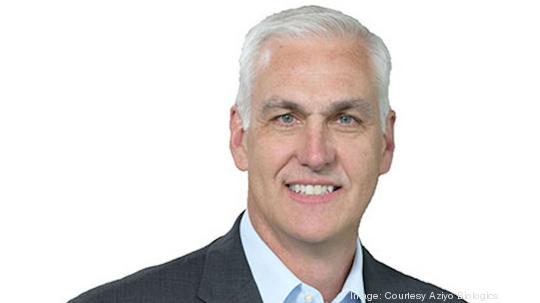
Aziyo Biologics started publicly trading on the Nasdaq stock exchange in October with plans to hire new sales employees, expand its marketing program, develop its product and advance clinical research.
Aziyo, a spinout of nonprofit tissue processing company Tissue Banks International, filed for its initial public offering in mid-September — six months into the pandemic — armed with about $45 million raised up to that point. It raised that capital after launching products in hospitals across the country and teaming up with medical device behemoths Medtronic and Boston Scientific Corp., expanding in 2019 with an aggressive hiring spree and speeding up pipeline development and product commercialization.
The regenerative medicine company, whose products serve patients requiring reconstructive surgery or pacemakers, is not the first local player to go public; it follows SOC Telemed, Viela Bio, NextCure and others. But if we’ve learned anything, it’s that the first year post-IPO is worth watching.
The basics
- Location: Silver Spring
- Founded: 2015
- Leadership: Ron Lloyd, president and CEO
- What it does: Sells human tissue implants to regenerate tissue and reduce complications that come with surgery
- Revenue: $30.2 million in first three quarters of 2020
- Employees: 156 as of September
Rose Health
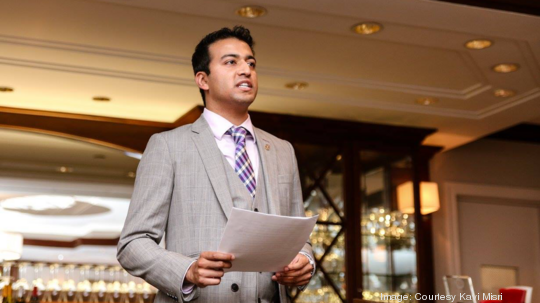
Founded in the waning weeks of 2019, Rose helps doctors identify mental health symptoms and get their patients necessary care. Then the pandemic struck and the still-infant startup had to ramp up faster than planned.
About a year later, CEO Kavi Misri is already breaking into new markets and hiring up to accommodate its growth. The company raised $1.63 million in an oversubscribed seed round, which paves more than a year of runway.
That future includes tapping new marketing and engineering employees, and building out its natural language processing system to eventually analyze speech and audio alongside microfacial expressions in video, to help with early detection of anxiety, depression or trauma. Rose, an acronym for “recognition of speech and emotion,” is also building out a new version for kids and teenagers, that’s slated for the first half of 2021.
It’s targeting primary care providers and looking to serve accountable care organizations, or groups of health care providers that offer coordinated care. It’s a shift from its initial model of selling directly to therapists and psychiatrists, in part because its platform is built to focus on reimbursing ACOs based on the quality of outcomes, not just through fees for a service. It represents a $7.7 billion market, according to Rose, which plans to start chasing other parts of it — including concierge employer benefits, health systems and hospitals, and payers — in 2021.
The basics
- Location: D.C.
- Founded: 2019
- Leadership: CEO Kavi Misri
- What it does: Provides a patient engagement platform for mental health symptoms
- Revenue: $48,000 in 2020, projecting $1.7 million for 2021
- Employees: 22
Airside Mobile Inc.
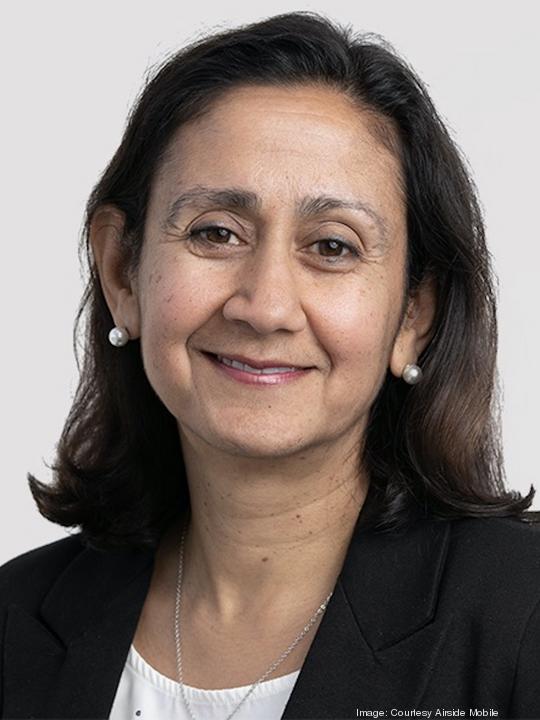
Airside Mobile, the tech startup behind a Mobile Passport app known for helping users to bypass long wait times at airports, set out in 2020 to expand beyond that platform — as the pandemic hindered widespread travel.
The pivot meant delving into identity verification and management, a move bolstered by a $13.6 million raise Airside closed in July. That funding came on top of about $12.7 million to date, according to venture data firm PitchBook.
The company’s tech, launched in 2009 to provide services to travelers, is now being applied more broadly. It’s being used with software to secure financial transactions — helping organizations comply with banking regulations and reduce fraud on retail transactions, for instance.
And 2021 marks a new era for the company, with a new face at the top: Amena Ali assumed the CEO position with Airside in November, replacing former chief and co-founder Hans Miller, who has moved to the chief strategy officer position.
Under new leadership, the company plans to advance the Digital Identity app it launched in 2020 to safely share identification from mobile devices — including Covid test results required to enter certain countries. The company, now with nearly 10 million customers, is seeing demand for such services accelerate during the health crisis, it said, and it doesn’t expect that to slow down in 2021.
The basics
- Location: Arlington
- Founded: 2009
- Leadership: Amena Ali, CEO
- What it does: Provides a secure ID verification system behind the Mobile Passport app
- Revenue: Declined to disclose
- Employees: Fewer than 50
GoOats LLC
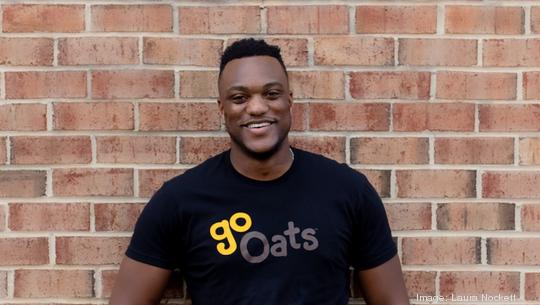
When 2020 upended Nahum Jeannot’s plans for on-the-go breakfast startup GoOats, he got his big break.
The local entrepreneur pitched his business on ABC’s “Shark Tank” in an episode that aired in October and saw him score a deal with Barbara Corcoran: $150,000 in exchange for a 20% equity stake. The company had taken in less than $60,000 prior to the show and closed 2020 with more than $350,000.
Jeannot, a Philadelphia native with parents of Caribbean descent, started the company after landing his first restaurant job at age 16. He attended culinary school, got a gig as a busboy and ascended in the food business, ultimately to executive chef. But his idea for GoOats came to fruition in 2017 when he launched the product in 16 Whole Foods Market stores, making deliveries and stocking shelves before work and holding demos on weekends. It grew from there.
Jeannot took on credit card debt, sold his new 2015 Mustang, dipped into his 401(k), moved out of his condo into a basement and pumped any money he saved back into the business. He personally invested at least $150,000 and received $25,000 from a friend who’s now part of the team.
This year, GoOats is vying for explosive growth fueled by new partners, new innovations and “a deeper local presence,” Jeannot said. “We’ve been waiting for this opportunity for years, the time has come and now we’re ready to deliver.”
The basics
- Location: Alexandria
- Founded: 2017
- Leadership: Nahum Jeannot, founder
- What it does: Makes bite-sized morsels of frozen steel-cut oats
- Revenue: More than $350,000 in 2020; projecting more than $2 million for 2021
- Employees: 10, likely to double in the first quarter
GloveStix
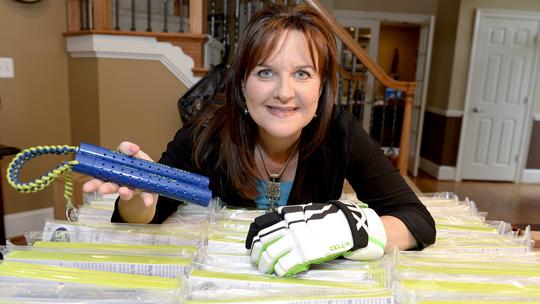
Krista Woods told herself she’d grow her startup for five years before selling it. Her solution for smelly athletic apparel is now 5 years old. So, is this the time?
“I do plan on selling at some point,” she said. But there’s also a lot she wants to accomplish first, she said, namely an international expansion she put on hold during the Covid outbreak, because “going international and potentially doubling my business in a matter of a few months would make a big difference on that.”
The Loudoun County mom whose invention won her fame on ABC’s “Shark Tank,” NBC’s “Today Show” and QVC had to regroup in 2020 when sports, and therefore sales, stopped. Then Amazon changed its e-commerce algorithm to focus on hand sanitizer and toilet paper — pandemic products — pushing GloveStix off of its Prime service with monthslong delivery delays. Her intention to reach $2 million in revenue dissipated.
That was after a series of previous setbacks that included a defective batch of her GloveStix inserts, the deodorizing piece of her product that generates recurring revenue, and ultimately not closing her “Shark Tank” deal.
But Woods rebounded, taking a deep dive into her customer base and changing her marketing strategy to reach the people using GloveStix to squash stench in all areas of their lives, not just the field or court — but also in their boots and orthotics, laundry baskets, garbage cans, drawers and more. She kept her business profitable through the madness and plans to attack this year with a new advertising plan, a new website and a new outlook.
The basics
- Location: Ashburn
- Founded: 2015
- Leadership: Krista Woods, founder
- What it does: Makes a device that kills odor and bacteria in athletic gear
- Revenue: Nearly $1 million in 2020; projecting more than $1.25 million for 2021
- Employees: Just Woods and up to 10 contractors for administrative duties
Allay Lamp
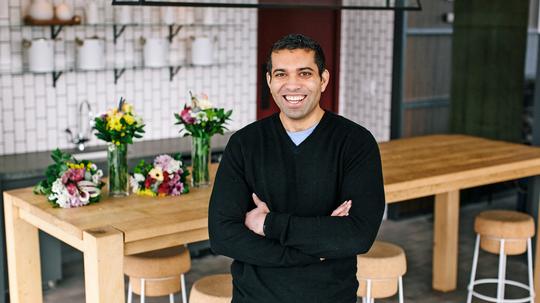
Allay Lamp had a steep road ahead when it launched in 2019 into a market saturated with ineffective products and services for migraine sufferers.
But the company set out to help the 40 million people plagued by these debilitating headaches in the U.S. and it’s heading into 2021 to bring that plan to fruition with its patented band of green light. First, that meant tapping social media influencers in the migraine community to try the lamps and share their thoughts with their networks. The team intends to expand that effort this year.
In its early days, the startup raised less than $1 million in funding and already sees profits in its future, with no plans to seek more from investors at this point.
The company’s technology stems from Dr. Rami Burstein’s research from Harvard Medical School and Beth Israel Deaconess Medical Center, which has an equity stake in the company. Burstein teamed up with Ajay Kori — who had stepped away in 2019 from day-to-day operations with online flower delivery firm UrbanStems, where he remains chairman — and others.
The basics
- Location: D.C.
- Founded: 2019
- Leadership: Co-founders Ajay Kori, Jeff Sheely, Mark Severs and Dr. Rami Burstein
- What it does: Makes a device to help alleviate migraines and headaches and reduce anxiety
- Revenue: Less than $1 million in 2020; projecting $5 million to $10 million for 2021
- Employees: Six
Aperiomics Inc.
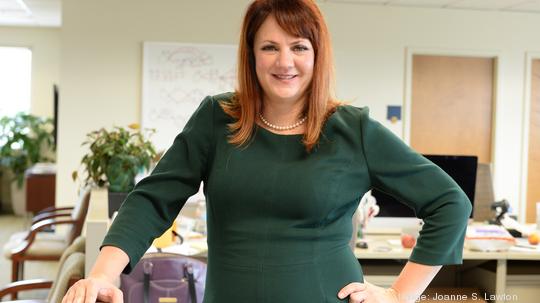
You may wonder why we’re still watching Aperiomics, after keeping our eyes on the now 7-year-old diagnostic startup in 2017 and 2020. But the biotech makes this year’s list for good reason.
In the last year, it had secured more funding for a round it initially closed in 2019 and pivoted its testing to the Covid-19 arena. The company reopened and closed its Series A round at $3 million. It’s now raising a $1 million bridge note to fund operations ahead of a planned Series B round in mid-2021, after raising $1.8 million in nondilutive government grant funding and another $512,000 in seed funding to date.
Aperiomics is providing its coronavirus test to D.C.-area universities, airlines, hotels and other businesses and, as well, intends to roll out new products in 2021. The business has also hit some bumps, including falling short of an initial $2 million target for its latest round and separately failing to receive the Food and Drug Administration approval it needed to advance a rapid antibody test for which it’s since cut bait.
But the startup and its leadership have regrouped and reset with big ambitions. That playbook includes beginning insurance billing with Medicare, BlueCross BlueShield, United HealthCare and Cigna.
The startup’s technology pinpoints causes of unsuccessfully diagnosed chronic infections, using genomic sequencing and machine learning to identify every known pathogen — bacteria, virus, parasite or fungus — behind mysterious illnesses. The company said its testing has helped more than 1,200 health care providers across 24 countries since its 2014 founding.
The basics
- Location: Sterling
- Founded: 2014
- Leadership: Crystal Icenhour, CEO
- What it does: Makes a test for every known pathogen causing mysterious illness
- Revenue: Exceeded $1 million in 2020 for the third consecutive year; projecting 50% increase in 2021 and 600% growth in 2022; declined to disclose specifics
- Employees: 12, plans to reach 23 in 2021
Cyrano Therapeutics Inc.
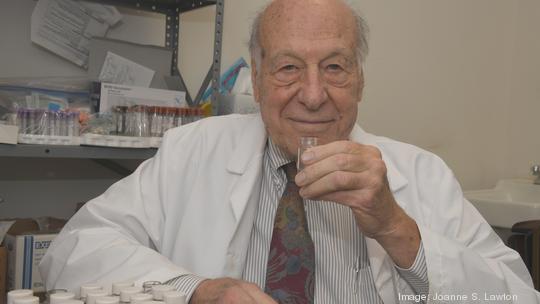
Cyrano Therapeutics launched about six years before the Covid-19 outbreak, but the virus helped shine a spotlight on the very issue the company wants to correct: the loss of taste and smell. Dr. Robert Henkin, its founder, conducted research at the National Institutes of Health and, more than 40 years ago, started the Taste and Smell Clinic of Washington, D.C.
Now he’s taking his startup to the next level with $14 million in fresh funding to initiate clinical trials for its candidate — an intranasal spray for olfactory impairment, or the chronic loss of smell and an associated loss of flavor function that many coronavirus patients experience.
That money also enables the business to expand Cyrano’s footprint, specifically to help set up other clinical sites across the U.S. to serve patients suffering from the condition, which can also develop following allergy, head injury, anesthesia or other viruses.
“We think this is going to be a very important instrument to help these many, many people who are developing these problems,” Henkin told us in November. It may be a couple of years before Cyrano has the data to seek approval from the Food and Drug Administration to take its product to market. But that timeline could shorten since there’s an unmet medical need, according to Henkin. Until then, we’ll be watching its progress.
The basics
- Location: D.C.
- Founded: 2014
- Leadership: Dr. Robert Henkin, founder
- What it does: Developing a treatment for patients with a chronic loss of smell and taste
- Revenue: Pre-revenue
- Employees: 10
Soupergirl
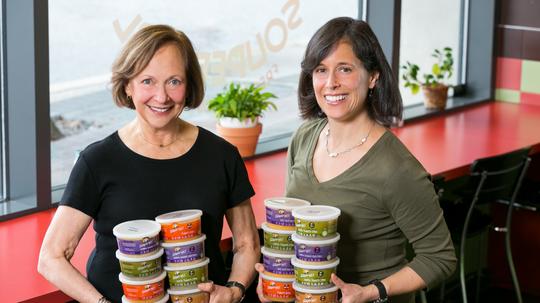
Vegan soup company Soupergirl welcomed 2020 with big plans, aiming to grow 2019’s revenue by about 70%. Then the pandemic drove owner Sara Polon to change her business model, shutting down her Dupont Circle brick-and-mortar store in the face of tanking revenue and ultimately landing flat for 2020. But that’s a win in Polon’s book.
In mid-2020, she opened her 12-year-old company’s first funding round, and closed that $2 million raise in September with investments from some big-name locals, including Chevy Chase-based Arborview Capital, Honest Tea founder Seth Goldman and Glen’s Garden Market founder Danielle Vogel. That milestone makes the company “poised for extraordinary, yet responsible growth in 2021,” Polon said.
Now Soupergirl is doubling down on its consumer sales, in which it ships and delivers veggie-based soups to 450 people per week — a number Polon hopes to triple in the first quarter. It’s also looking to expand the grocery channel, hiring and marketing, expanding to a larger facility and broadening its delivery zones within Greater Washington. And the business now offers fully subsidized health insurance to its full-time employees.
Polon started the business with her mother, Marilyn, in 2008. Ten years later, they took their pitch to ABC’s “Shark Tank” and, though they left without a deal, they got a mentor and a big boost from the exposure.
The basics
- Location: D.C.
- Founded: 2008
- Leadership: Sara Polon, owner
- What it does: Makes and sells soup through consumer subscriptions, as well as grocery and retail sales
- Revenue: $3 million in 2020; projecting $4 million for 2021
- Employees: 38
Symbiosis LLC


Arun Mallikarjunan and Subha Nagasubramanian, the married business partners behind medical coworking startup Symbiosis, launched their venture years before the pandemic. Then demand surged.
The co-founders are now raising $750,000 in a seed round to hire more employees, expand their D.C. site by 2,500 square feet and add locations in Fairfax County. That’s before another potential raise in the coming years for the co-founders, who put in $300,000 of their own money to start the company and funded it through revenue since 2019.
The company charges tenants for services from scheduling to insurance, and the Symbiosis team handles their operations through contracts that range anywhere from $500 to $5,000 per month. It’s also working to build its own proprietary practice management platform for clinicians and providers. Ultimately, Symbiosis would market that software to users beyond its own tenants and, potentially, spin that off into its own company. It’s all with an eye toward supporting doctors who, in today’s health care environment, must function as entrepreneurs themselves.
That’s while the industry sees increasing consolidation, as self-employed physicians affiliate with larger health systems and secure venture capitalist backing. It’s a dynamic that has only intensified during the pandemic, as the financial hurdles to successfully running an independent health care practice grow ever larger, creating even greater demand for Symbiosis’s services, the duo said.
The basics
- Location: D.C.
- Founded: 2017
- Leadership: Co-founders Arun Mallikarjunan, CEO, and Subha Nagasubramanian
- What it does: Rents space to and helps operate health care practices
- Revenue: More than $200,000 in 2020; projecting $300,000 for 2021 and $1 million for 2022
- Employees: Seven
True Made Foods
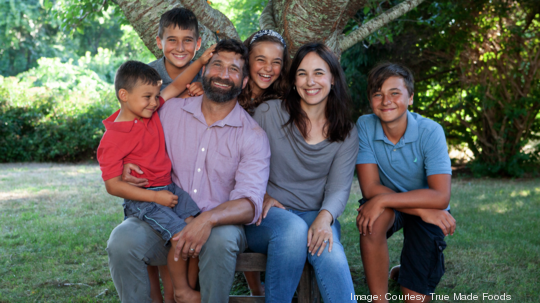
Five-year-old bottled sauce maker True Made Foods closed 2020 with a three-year contract with the Boston Red Sox as the exclusive condiment provider to Fenway Park. That deal could mean about $500,000 in potential revenue for the 2021 baseball season. And it allows the business to break into distribution.
It’s planning to sign another baseball stadium and potentially two arenas as exclusive vendor partners this year, before delving deeper into food service in the latter half of 2021. The company expects to target colleges and universities, stadiums and corporate cafeterias.
But True Made Foods won’t abandon its retail products, now in about 5,000 stores nationwide including Whole Foods Market, Giant Food, Kroger, Safeway and Wegmans. It also expects to introduce new mustards and barbecue sauces, rubs and hot sauces.
The business plans to raise a round of at least $3 million this year, allowing it more than two years of runway and its first marketing budget to pursue larger venues and contracts. That funding would follow a $2 million round it closed in summer 2019. True Made Foods, founded in 2015, sweetens its dressings with fruits and veggies in place of artificial sugars.
Before starting the company, Abe Kamarck served in the U.S. Navy as a helicopter pilot until 2008 and spent the next seven years as an entrepreneur in emerging markets, living in Bulgaria, Qatar, Ghana, China and Egypt. He returned to Washington to launch nonprofit Coexist Coffee. That fell apart in 2014, but “got me pretty excited about the food business,” he told us back in 2018. When he saw the market’s shift toward healthy eating and a friend mentioned the idea of incorporating veggies into ketchup, he said, “it just set lightbulbs off.”
The basics
- Location: Alexandria
- Founded: 2015
- Leadership: Abe Kamarck, founder and CEO
- What it does: Makes and sells vegetable-infused condiments
- Revenue: $2.3 million in 2020; projecting $5 million for 2021
- Employees: Three
FiscalNote Inc.
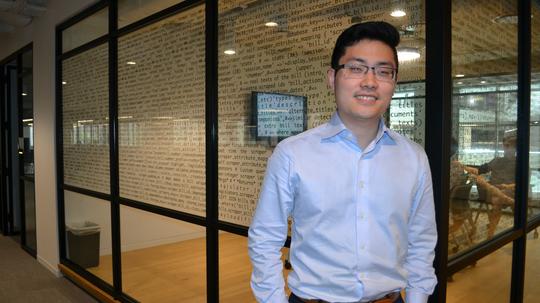
We’ve watched FiscalNote since its 2013 founding through mammoth funding raises, its $180 million purchase of CQ Roll Call, moves to stimulate aggressive growth, a period of tumult in 2019 and steps toward an eventual IPO.
It’d be silly to look away now.
The company, whose software helps clients track and take actions on laws and regulations, raised $160 million in new funding in December to further develop its services, pursue more acquisitions and expand into new international markets, as well as to refinance existing debt. That money came about a year after it raised $92 million and brought its total raised to more than $347 million, according to data from PitchBook.
It also came after the company laid off roughly 30 CQ Roll Call staffers in the early days of the pandemic before it was approved for an $8 million loan from the Small Business Administration’s Paycheck Protecting Program, per SBA data.
As to what comes next? It’s unclear where FiscalNote stands on the going-public front, but there’s no doubt founder and CEO Tim Hwang has a unique ability to fundraise and pull together deals.
The basics
- Location: D.C.
- Founded: 2013
- Leadership: Tim Hwang, founder and CEO
- What it does: Produces a legislative and regulatory dashboard
- Revenue: Declined to disclose
- Employees: 450